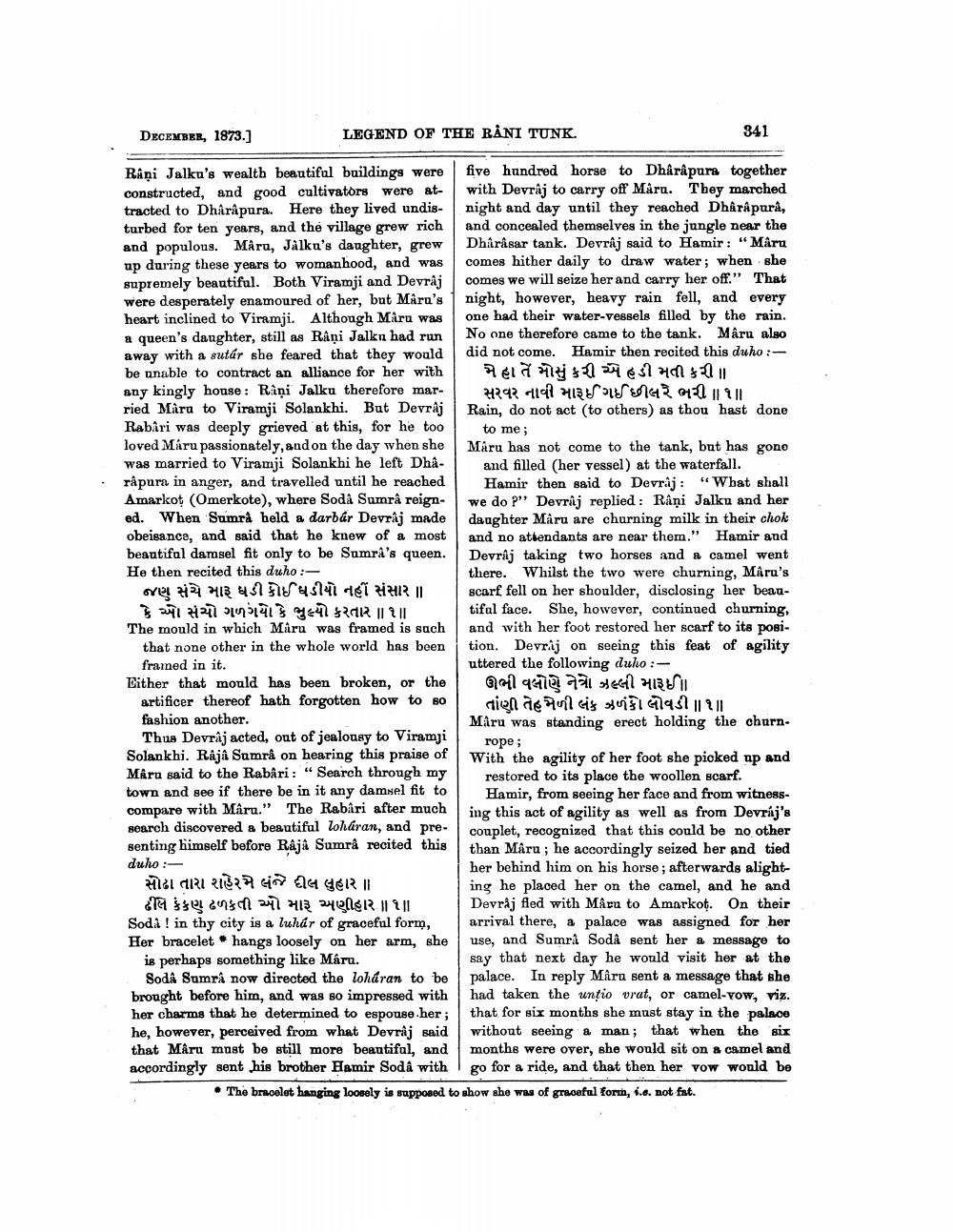________________
LEGEND OF THE RANI TUNK.
DECEMBER, 1873.]
Rani Jalku's wealth beautiful buildings were constructed, and good cultivators were attracted to Dhârâpura. Here they lived undisturbed for ten years, and the village grew rich and populous. Mâru, Jalka's daughter, grew up during these years to womanhood, and was supremely beautiful. Both Viramji and Devraj were desperately enamoured of her, but Mâru's heart inclined to Viramji. Although Mâru was a queen's daughter, still as Râni Jalkn had run away with a sutár she feared that they would be unable to contract an alliance for her with any kingly house: Rani Jalku therefore married Maru to Viramji Solankhi. But Devraj Rabari was deeply grieved at this, for he too loved Máru passionately, and on the day when she was married to Viramji Solankhi he left Dhârâpura in anger, and travelled until he reached Amarkot (Omerkote), where Soda Sumrâ reigned. When Sumrå held a darbár Devraj made obeisance, and said that he knew of a most beautiful damsel fit only to be Sumra's queen. He then recited this duho:
જણ સંચે મારૂ ઘડી કોઈ ધડીયો નહીં સંસાર ॥ કે આ સંચો ગળગયા કે ભુલ્યો કરતાર ||૧||
The mould in which Maru was framed is such that none other in the whole world has been framed in it.
Either that mould has been broken, or the artificer thereof hath forgotten how to so fashion another.
Thus Devraj acted, out of jealousy to Viramji Solankhi. Raja Sumrâ on hearing this praise of Mâru said to the Rabâri: "Search through my town and see if there be in it any damsel fit to compare with Mâra." The Rabâri after much search discovered a beautiful loharan, and presenting himself before Raja Sumrâ recited this duho:
341
સોઢા તારા શહેરને લંજે દીલ લુહાર
ઢીલે કંકણુ ઢળકતી ો મારૂ અણીહાર ||૧|| Soda! in thy city is a luhár of graceful form, Her bracelet hangs loosely on her arm, she is perhaps something like Mâru.
five hundred horse to Dhârâpura together with Devraj to carry off Mâru. They marched night and day until they reached Dhârâpurâ, and concealed themselves in the jungle near the Dhârâsar tank. Devraj said to Hamir: "Mâru comes hither daily to draw water; when she comes we will seize her and carry her off." That night, however, heavy rain fell, and every one had their water-vessels filled by the rain. No one therefore came to the tank. Mâru also did not come. Hamir then recited this duho:
ને હા તે મોટું કરી એ હડી મતી કરી સરવર નાવી મારૂઈ ગઈ છીલરે ભરી ||૧||
Rain, do not act (to others) as thou hast done to me;
Mâru has not come to the tank, but has gone and filled (her vessel) at the waterfall.
Hamir then said to Devraj: "What shall we do ?" Devraj replied: Râni Jalku and her daughter Maru are churning milk in their chok and no attendants are near them." Hamir and Devraj taking two horses and a camel went there. Whilst the two were churning, Mâru's scarf fell on her shoulder, disclosing her beautiful face. She, however, continued churning, and with her foot restored her scarf to its position. Devraj on seeing this feat of agility uttered the following duho :
ઊભી પણે નેત્રો પ્રતી મા
તારી તે મેળી લક નવકો બોવડી ॥૧॥
Mâru was standing erect holding the churn
rope;
With the agility of her foot she picked up and restored to its place the woollen scarf.
Hamir, from seeing her face and from witnessing this act of agility as well as from Devraj's couplet, recognized that this could be no other than Mâru; he accordingly seized her and tied her behind him on his horse; afterwards alighting he placed her on the camel, and he and Devraj fled with Maru to Amarkot. On their arrival there, a palace was assigned for her use, and Sumrâ Sodâ sent her a message to say that next day he would visit her at the Soda Sumrâ now directed the loháran to be palace. In reply Mâru sent a message that she brought before him, and was so impressed with had taken the unțio vrat, or camel-vow, viz. her charms that he determined to espouse.her; that for six months she must stay in the palace he, however, perceived from what Devraj said without seeing a man; that when the six that Mâru must be still more beautiful, and months were over, she would sit on a camel and accordingly sent his brother Hamir Sodâ with go for a ride, and that then her vow would be The bracelet hanging loosely is supposed to show she was of graceful form, i.e. not fat.




